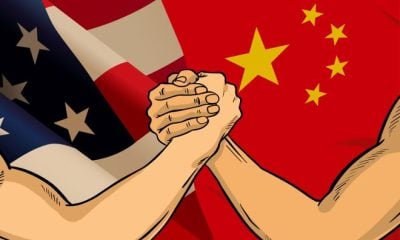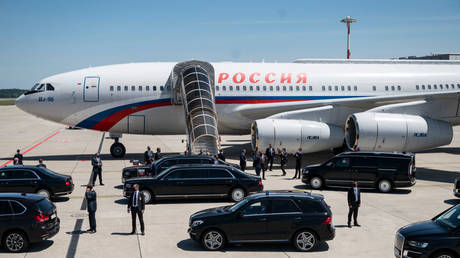Is US Officialdom Insane? The U.S. Is Trying to Bully China

All Global Research articles can be read in 51 languages by activating the Translate Website button below the author’s name (only available in desktop version).
To receive Global Research’s Daily Newsletter (selected articles), click here.
Click the share button above to email/forward this article to your friends and colleagues. Follow us on Instagram and Twitter and subscribe to our Telegram Channel. Feel free to repost and share widely Global Research articles.
Global Research Referral Drive: Our Readers Are Our Lifeline
***
A foreboding article was published on April 24. It was pointed out that China had provided a berth to a Russian ship Angara that is purportedly “tied to North Korea-Russia arms transfers.”
Reuters cited Royal United Services Institute (RUSI) – which boasts of itself to be “the world’s oldest and the UK’s leading defence and security think tank” – which claims Angara, since August 2023, has transported “thousands of containers believed to contain North Korean munitions,” [italics added] to Russian ports.
Container ships transport containers, and along the way they dock in certain harbors. Until satellite photos have X-ray capability any speculation about what is inside a container will be just that: speculation. Discerning readers will readily pick up on this.
Despite China repeatedly coming out in favor of peace, Reuters, nonetheless, plays up US concerns over perceived support by Beijing for “Moscow’s war” (what Moscow calls a “special military operation”) in Ukraine.
And right on cue, US secretary-of-state Antony Blinken shows up in Beijing echoing a list of US concerns vis-à-vis China.
Blinken had public words for China:
“In my meetings with NATO Allies earlier this month and with our G7 partners just last week, I heard that same message: fueling Russia’s defense industrial base not only threatens Ukrainian security; it threatens European security.
Beijing cannot achieve better relations with Europe while supporting the greatest threat to European security since the end of the Cold War. As we’ve told China for some time, ensuring transatlantic security is a core US interest. In our discussions today, I made clear that if China does not address this problem, we will.”
It would seem clear that the Taiwan Straits is a core China interest, no? Or is it only US core interests that matter?
Blinken:
“I also expressed our concern about the PRC’s unfair trade practices and the potential consequences of industrial overcapacity to global and US markets, especially in a number of key industries that will drive the 21st century economy, like solar panels, electric vehicles, and the batteries that power them.
China alone is producing more than 100 percent of global demand for these products, flooding markets, undermining competition, putting at risk livelihoods and businesses around the world.”
It sounds like sour grapes from the US that China’s R&D and manufacturing is out-competing the US. Take, for example, that the US sanctions Huawei while China allows Apple to sell its products unhindered in China. China has hit back at the rhetoric of “overcapacity.”
Blinken complained of “PRC’s dangerous actions in the South China Sea, including against routine Philippine maintenance operations and maritime operations near the Second Thomas Shoal. Freedom of navigation and commerce in these waterways is not only critical to the Philippines, but to the US and to every other nation in the Indo-Pacific and indeed around the world.”
Mentioning freedom of navigation implies that China is preventing such.
Why is freedom of navigation in the South China Sea critical to the US? Second Thomas Shoal is a colonial designation otherwise known as Renai Jiao in China. The “routine Philippine maintenance operations and maritime operations” that Blinken speaks of are for a navy landing craft that was intentionally grounded by the Philippines in 1999. Since then, the Philippines has been intermittently resupplying its soldiers stationed there.
Blinken:
“I reaffirmed the US’s ‘one China’ policy and stressed the critical importance of maintaining peace and stability across the Taiwan Strait.”
How does the US stationing US soldiers on the Chinese territory of Taiwan without approval from Beijing reaffirm the US’s commitment to a one-China policy? The Shanghai Communiqué of 1972 states “the United States acknowledges that Chinese on either side of the Taiwan Strait maintain there is but one China and that Taiwan is a part of China. The United States does not challenge that position.”
Blinken:
“I also raised concerns about the erosion of Hong Kong’s autonomy and democratic institutions as well as transnational repression, ongoing human rights abuses in Xinjiang and Tibet, and a number of individual human rights cases.”
Evidence of human rights abuses in Xinjiang? This is a definitive downplay from the previous allegations of a genocide against Uyghurs. It would be embarrassing to continue to accuse China of a genocide in Xinjiang due to a paucity of bodies which is a sine qua non for such a serious allegation as a genocide; meanwhile the US-armed Israel is blowing up hospitals and schools with ten-of-thousands of confirmed Palestinian civilian bodies. Even if there are human rights abuses in Xinjiang (which should be deplored were there condemnatory evidence), the US would still be morally assailable for its selective outrage.
Blinken:
“I encouraged China to use its influence to discourage Iran and its proxies from expanding the conflict in the Middle East, and to press Pyongyang to end its dangerous behavior and engage in dialogue.”
Is the US militarily backing a genocide of Palestinians a “conflict.” Are US military maneuvers in the waters near North Korea “safe behavior”?
Blinken responded to a question:
“But now it is absolutely critical that the support that [China’s] providing – not in terms of weapons but components for the defense industrial base – again, things like machine tools, microelectronics, where it is overwhelmingly the number-one supplier to Russia. That’s having a material effect in Ukraine and against Ukraine, but it’s also having a material effect in creating a growing [sic] that Russia poses to countries in Europe and something that has captured their attention in a very intense way.”
Are the ATACMS, Javelins, HIMARS, Leopard tanks, drones, artillery, Patriot missile defense, etc supposed to be absolutely uncritical and have no material effect on the fighting in Ukraine? And who is posing a threat to who? European countries are funding and arming Ukraine and sanctioning Russia not vice versa? It sounds perversely Orwellian.
*
From Biden to Harris to Yellen to Raimondo to Sullivan to Blinken, US officials again and again try to browbeat and put down their Chinese colleagues.
At the opening meeting on 18 March 2021 of the US-China talks in Anchorage, Alaska, the arrogance of Blinken and the US was put on notice by the rebuke of Chinese foreign affairs official Yang Jiechi:
“[T]he US does not have the qualification to say it wants to speak to China from a position of strength.”
It doesn’t seem to have sunk in for the American side.
The Russia-China relationship is solid. China’s economy is growing strongly. Scores of countries are clamoring to join BRICS+ and dedollarization is well underway. Yet, the US continues to try to bully the world’s largest – and still rapidly growing – economy. This strategy appears to affirm the commonly referred to aphorism about the definition of insanity: trying the same thing over and over and expecting a different result.
*
Note to readers: Please click the share button above. Follow us on Instagram and Twitter and subscribe to our Telegram Channel. Feel free to repost and share widely Global Research articles.
Kim Petersen is an independent writer. He can be emailed at: kimohp at gmail.com. He is a regular contributor to Global Research.
Featured image is from InfoBrics



